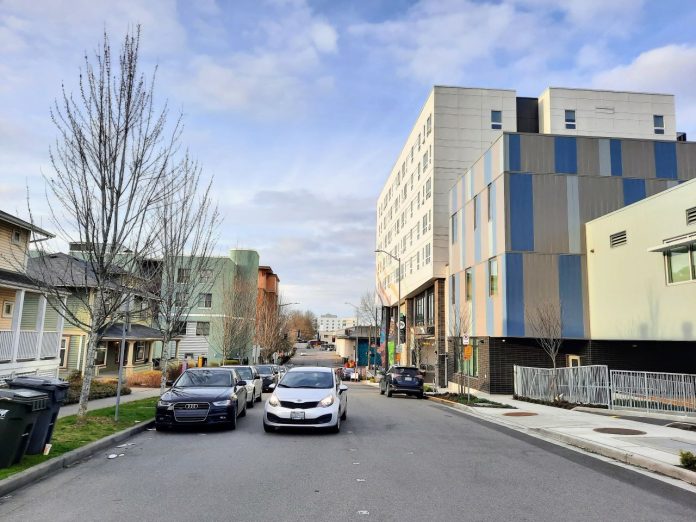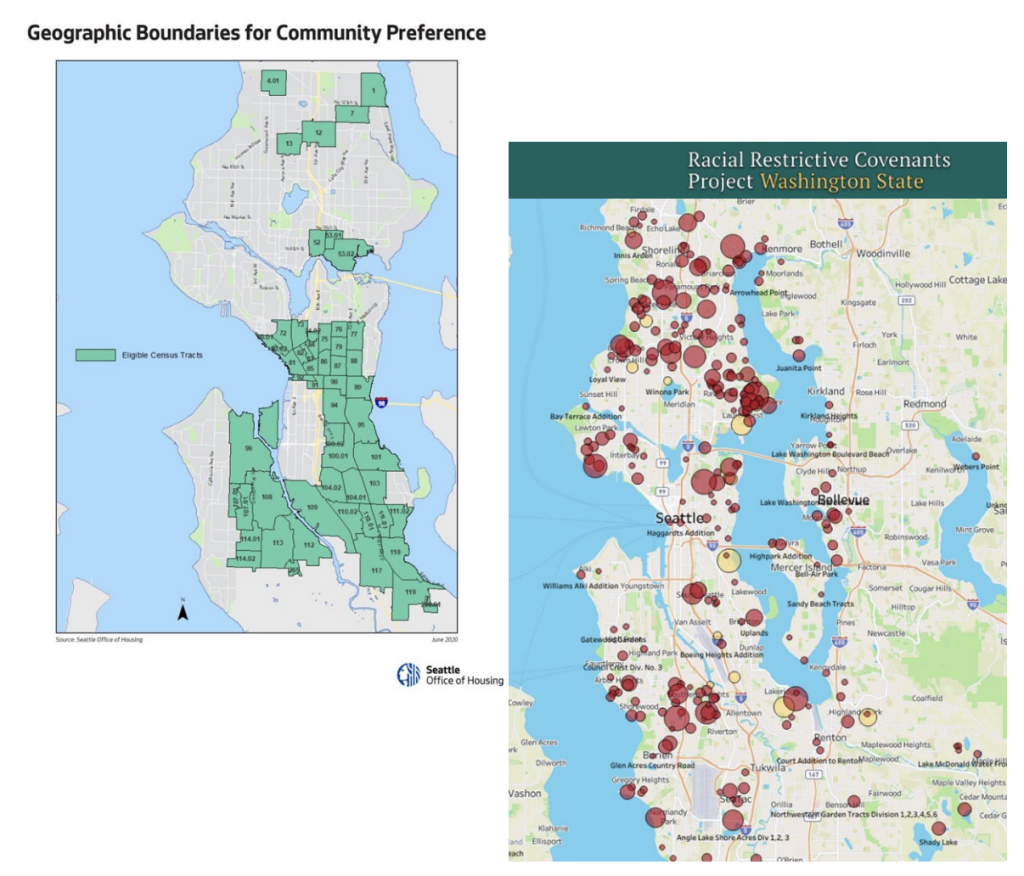
In a 2-7 vote Tuesday, the Seattle City Council rejected the “Connected Communities” equitable development proposal put forth by land use chair Tammy Morales (District 2). The vote split along factional lines with only Morales and Dan Strauss (District 6) voting yes, and all centrist councilmembers united against the proposal, citing a wide variety of concerns.
The pilot program had been scoped to offer zoning incentives for up to 35 redevelopments that partner with local nonprofits to deliver at least 30% on-site affordable housing largely focused in high-displacements neighborhoods of color as a way to counteract that displacement. Morales’ District 2 is the most racially diverse in the city and has been a focal point of displacement.
The bill arrived at full council with a recommendation from the land use committee that it not pass, which indicated Morales would need to win over her colleagues not on the committee in order to earn enough votes to secure passage. Despite her best efforts and supportive public comments from nonprofit homebuilders and housing advocates, that failed to happen.
“The original bill continues to add workforce, affordable housing, cultural spaces, commercial spaces in neighborhoods with racially restrictive covenants. This is an anti-displacement tool,” Morales said just before the vote. “It removes design review, parking [requirements], requires 33% on-site performance [of affordable congregate units], and a floor area ratio that can help community based organizations develop on their property and partner with developers. It does not cost the City money. It’s an opportunity to develop housing that does not require housing levy or other subsidized funding.”
Seeing two years of work on the proposal go up in smoke, Morales shared her disappointment after the vote.
“Seattle is in a housing crisis, and as policymakers, our actions speak louder than our words. We need to create more affordable housing now, and my proposal would have done just that. To wait until the Comprehensive Plan update is transmitted to Council at the end of this year is not taking our housing crisis seriously,” Morales said in a statement. “The Comprehensive Plan sets a policy guideline – the way we implement it is to pass legislation. My Connected Communities legislation would have produced more affordable housing, commercial affordability, and anti-displacement measures right now. I’m incredibly disappointed in its failure to pass today.”
Three of the councilmembers who voted no — Cathy Moore (District 5), Maritza Rivera (District 4), Tanya Woo (citywide) — offered their own joint press release sharing their concerns, focused on a desire to run zoning incentive programs through the grand process that is the Major Update to the Seattle Comprehensive Plan that is due at year’s end — but very behind schedule, which will limit time for major changes to the Mayor’s plan. And as Morales noted, as a policy guidance document, the Comprehensive Plan does not set zoning directly. The zoning package is not expected until mid-2025.
“A more effective approach to attaining citywide neighborhood affordability is to make the benefit of development capacity generally available to all and to do so through the draft Comprehensive Plan under consideration. For this reason, I am voting no. I look forward to working on expanding the benefit of affordable development capacity to all in the city through the vehicle of the Comprehensive Plan,” Moore said in her statement.
To summarize, speaking in favor of the CC pilot:
— The Urbanist (@UrbanistOrg) April 30, 2024
350 Seattle, Real Change, Seattle Tech for Housing, SHARE, Bellwether, Habitat for Humanity, planning commissioner Matt Hutchins and more.
In more off-the-cuff remarks at Council Briefing on Monday, Moore vented her anger at Morales and others criticizing her over her opposition to the bill in committee. In fact, she threatened to use the Council rules to censure Morales should Moore “feel that there are any ad hominem attacks being made on fellow council members who chose not to vote this bill out.”
“I’m gonna have to stay very calm,” Moore said Monday. “This vilification of your fellow council members in the media — it is uncalled for, it is unprofessional. We can have a respectful difference of opinion without meaning that we are evil or corporate shills or we have no concern for our fellow human beings or we are opposed to affordable housing. None of that is the case, and I am tired of that being the narrative that I hear coming. And so again, I’m going to stop because I’m losing my temper. But I want this to be a respectful conversation tomorrow based on policy, not personality and no impugning of my or my fellow colleagues’ motivations.”
Morales pointed out that she had not impugned anyone’s motives, and neither The Urbanist nor other outlets could find any instance of Morales calling her or her colleagues “evil” or “corporate shills” or anything similar. It could be Moore was referring to comments from members of the general public rather than her “esteemed colleague.” Moore did not share any further discussion of the policy proposal during council deliberations Tuesday.
In their press release, the trio of councilmembers stated a desire to use the City’s existing Mandatory Housing Affordability (MHA) program (Seattle’s version of inclusionary zoning) and Multi-Family Tax Exemption programs to boost affordable housing development, promising a review of the programs in Council’s housing committee over the next two years to “ensure both tools achieve the most affordable housing units possible.” The joint release said “the Council will have the opportunity to work together to ensure that affordable housing is prioritized in the adopted Comprehensive Plan, including the application of MHA in neighborhood zones.”
Some senior Harrell officials, particularly Chief Operating Officer Marco Lowe (who worked for the Master Builders Association of King and Snohomish Counties before joining the administration) have espoused a desire to exempt townhomes and other small-scale development in today’s Neighborhood Residential zones from MHA in order to ensure those projects are actually feasible and the homes actually get built. This could portend an area of policy disagreement where councilmembers may seek to amend Harrell’s growth strategy.
Councilmember Bob Kettle (District 7) was firmly opposed to the bill and cited process concerns and efficacy worries, urging them to send it back to land use committee to fine tune and get a recommendation. Before running for office, Kettle had been a leader with the Queen Anne Community Council, which had been a hotbed of housing opposition.
Councilmember Joy Hollingsworth (District 3) seemed close to voting yes, but she shared reservations with the approach of focusing development — even if it included some affordable housing — in formerly redlined communities of color, hinting at a preference for a surge of mixed-income development in wealthier, Whiter areas.
“One of my biggest concerns is that the bill concentrates and encourages growth in neighborhoods that are already diverse neighborhoods,” Hollingworth said. “70% [of new homes] are market-rate; therefore those are expensive. This will likely have the effect on making existing diverse and neighborhoods Whiter and wealthier.”

Councilmember Rob Saka (District 1) said he was “curiously intrigued by the bill,” but thought it wouldn’t actually work, and had some concerns about environmental justice and the racial impact.
“For me today, I have a host of big picture concerns about this legislation, ranging from its basic feasibility to how it actually builds generational wealth and ownership for our low-income neighbors. Or how we can address environmental justice with tree canopy air quality balancing with the increased density where Black and brown and other residents of color and low income folks already get concentrated in the highest traffic areas and the highest population areas as well.”
Saka seemed to tease a yes vote, but later clarified that he was only speaking to the Strauss amendments not the underlying bill.
“I am far from sanguine about the likely impact and long term efficacy of this bill is passed, but I’m also curiously intrigued as well,” Saka said. “What if what if it actually does work? I don’t know. That’s why today I’m prepared to vote yes.”
Strauss abstained on the bill’s vote in land use committee, saying he wanted a chance to amend the bill and that his amendments were not fully baked at that point. “I said earlier that I think this bill needed more time in committee,” Councilmember Morales, I hear you about the timeline. The timeline is not what drives decision-making; it is digestion understanding.”
Dan Strauss's latest amendment to CM Morales' Connected Communities pilot would:
— Ryan Packer (@typewriteralley) April 30, 2024
-Require affordable housing projects to also participate in MHA
-Remove exemptions from parking mandates
-Lower height limits
-Increase setback requirements
-Reduce FAR exemptions
-Remove social… pic.twitter.com/Zg080X06nq
Strauss presented his amendments as a substitute bill, which he said was now fully baked on Tuesday, even if he preferred to present them in committee on his own timeline. The Strauss version of the bill restricted the size of housing development under the program to a much greater degree; it kept parking mandates, increased setback requirements, lowered height limits, lowered floor area ratio, imposed facade length caps, removed social housing as qualifying, and required Mandatory Housing Affordability (MHA) participation in addition to the affordability already stipulated in the program.
Strauss said his amendment was intended to align the program with the bonus program for redeveloping religious institutions he authored and passed in 2021. “My amendment was an attempt to show my colleagues a pathway forward by using an already passed bill that is having a positive impact in our city,” Strauss told The Urbanist. “[The] religious bonus bill has demonstrated benefit and success. I hoped this demonstrated success would move my colleagues on the Connected Communities bill.”
On a 5-4 vote, councilmembers rejected the Strauss amendment.
“My concerns with the amendment is that it makes housing smaller and a little bit more expensive with all of the added additions,” Hollingworth said. “So unfortunately, I’m gonna go voting no on the amendment.”
Without his amendment, Strauss still voted yes on the underlying bill, but only after an unenthusiastic “sure” in the rollcall that the clerk required he clarify to a germane affirmative.
The rejection of this pilot program closes a path that could potentially deliver a few thousand more homes in the next decade, but the implications could also be more far-reaching, as it also sets the stage for Council’s Comprehensive Plan debate due later this year. The stated intent to use the city’s zoning and growth strategy to maximize affordable housing development, but the devil will be in the details and the follow through.
Doug Trumm is publisher of The Urbanist. An Urbanist writer since 2015, he dreams of pedestrian streets, bus lanes, and a mass-timber building spree to end our housing crisis. He graduated from the Evans School of Public Policy and Governance at the University of Washington in 2019. He lives in Seattle's Fremont neighborhood and loves to explore the city by foot and by bike.

